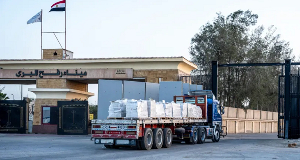The Steering Committee of the TUC has cautioned the government to be wary of the wholesale adoption of prescribed foreign policies, more importantly those related to trade that are being spearheaded by the Breton Wood Institutions.
In a statement issued in Accra on Thursday, the TUC said the Committee at its regular meeting on 11 June discussed a number of issues bordering on the economic well-being of the country and expressed concern on several subjects, including the intended sale of Ghana Commercial Bank (GCB), withdrawal of 20 per cent import duty on finished poultry products and the Public Procurement Bill.
The statement signed by Kofi Asamoah, Acting Secretary-General of the TUC, said the Committee noted with disquiet the government's intention to sell off its shares in GCB to foreign business concerns.
"While considering the significant contribution of GCB as a strategic asset to national development, the Committee recognises the Bank's spread all over the country making its accessible to a wider section of the society, especially the rural poor, in the provision of credit and other services.
The statement said the Committee noted the pressure being mounted by the international financial institutions on the government to privatise GCB and called on the government to be mindful of the relevance of a public bank to the development agenda of the county and not to succumb to such pressures.
On the withdrawal of 20 per cent import duty on poultry products, the TUC said it found it difficult to comprehend the rationale behind the withdrawal and questioned the constitutional basis of the reversal, especially coming after Parliament had extensively debated and approved the 2003 Budget Statement.
"In the opinion of the Committee, the unilateral action by government to withdraw the import duty is a drawback to good governance and democracy."
It said the government should, therefore, re-introduce the import duty to help Ghanaian poultry farmers not only to compete with their foreign counterparts but also enhance their productive capacity.
The TUC said it appreciated the need for a Public Procurement Bill, but stressed that it should be thoroughly discussed with civil society organisations and other stakeholders to ensure that it served the broader interests of Ghanaians.
The statement said much as the concept of transparency was key to the effective use of government's scarce resources, the underlying issue of market access as contained in the Bill needed to be critically examined. "Market access implies that both foreign and local contractors and suppliers of goods and services can access public works and supplies equally.
"This undoubtedly will operate to the disadvantage of local enterprises, which are not as well resourced like their foreign counterparts." It said the transparency and prevention of corruption could be achieved without compromising the development of local industries and consequently the economic development of the country.
The TUC said although the Public Procurement Board was supposed to be autonomous, the provision in the Bill, which sought to make it accountable to the Minister for Finance, would greatly undermine this autonomy.
"Similarly, the powers vested in the Minister of Finance...to decide the exemptions where different procurement procedure could be adopted in the interest of the nation could be abused," it said, adding that Parliament should be solely responsible for such exemptions.
"The Committee is of the conviction that the various contract value thresholds ....put local firms/contractors at a disadvantage. Where appropriate, large projects should be fragmented to enable local firms and contractors to bid for such projects."
General News of Friday, 20 June 2003
Source: gna












